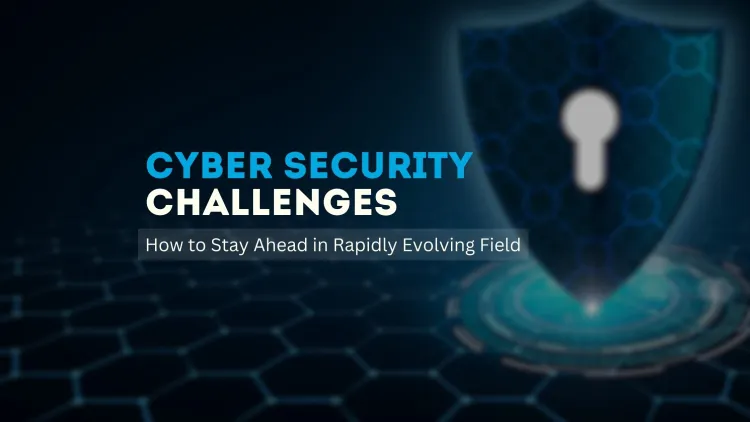Top 10 Cybersecurity Challenges in 2025 | How to Stay Ahead in a Rapidly Evolving Field
Cybersecurity is an essential field that plays a critical role in protecting systems, networks, and sensitive data from cyberattacks and unauthorized access. However, cybersecurity enthusiasts often face challenges, such as keeping up with constantly evolving threats, mastering complex tools, gaining practical experience, balancing theory with practice, dealing with imposter syndrome, and staying motivated. To overcome these challenges, one needs a combination of continuous learning, hands-on practice, staying updated on industry trends, and having the right resources and support. By facing these obstacles head-on, cybersecurity enthusiasts can pave the way to success in this fast-growing and rewarding field.

1. What is cybersecurity?
Cybersecurity is the practice of protecting computer systems, networks, and data from digital attacks, unauthorized access, theft, and damage. It involves using various technologies, processes, and controls to secure information and prevent cyberattacks.
2. Why is cybersecurity important?
Cybersecurity is crucial because it helps protect sensitive data such as personal information, financial records, and intellectual property from cybercriminals. A lack of proper security can lead to data breaches, financial losses, and damage to an organization's reputation.
3. What are the different types of cyberattacks?
Common types of cyberattacks include:
- Malware: Malicious software designed to damage or exploit systems.
- Phishing: Fraudulent attempts to acquire sensitive information via email or websites.
- Ransomware: Malware that locks or encrypts a system or files, demanding a ransom for access.
- Denial of Service (DoS): Overloading a system or network to make it unavailable.
- Man-in-the-Middle (MitM) attacks: Intercepting communication between two parties to steal or manipulate data.
4. How can I protect my personal data online?
To protect your personal data, you should:
- Use strong, unique passwords for each account.
- Enable two-factor authentication (2FA) wherever possible.
- Regularly update your software and operating systems.
- Be cautious when clicking on links or downloading attachments in emails.
- Use encryption tools to protect sensitive data.
5. What is ethical hacking?
Ethical hacking, also known as penetration testing or white-hat hacking, involves legally testing computer systems for vulnerabilities by simulating cyberattacks. Ethical hackers identify weaknesses in a system to help organizations strengthen their security.
6. What are the main challenges in cybersecurity?
Some of the key challenges include:
- Keeping up with constantly evolving cyber threats.
- Handling a shortage of skilled cybersecurity professionals.
- Securing devices and systems from advanced persistent threats (APTs).
- Balancing security with user convenience and privacy.
7. How do I get started in cybersecurity?
To start in cybersecurity, you can:
- Gain foundational knowledge in networking, operating systems, and security concepts.
- Learn programming languages like Python, C, or Bash scripting.
- Pursue certifications such as CompTIA Security+, Certified Ethical Hacker (CEH), or Certified Information Systems Security Professional (CISSP).
- Practice on platforms like Hack The Box, TryHackMe, or Capture The Flag (CTF) challenges.
8. What are some of the best cybersecurity certifications?
Some of the top cybersecurity certifications include:
- Certified Ethical Hacker (CEH)
- Certified Information Systems Security Professional (CISSP)
- CompTIA Security+
- Certified Information Security Manager (CISM)
- Certified Cloud Security Professional (CCSP)
9. What is the role of a cybersecurity analyst?
A cybersecurity analyst is responsible for protecting an organization's IT infrastructure by monitoring systems for security breaches, analyzing potential vulnerabilities, and responding to incidents. They also implement security measures and protocols to safeguard systems against attacks.
10. What are the most common cybersecurity tools?
Some common cybersecurity tools include:
- Wireshark: A network protocol analyzer.
- Nmap: A network scanning tool used for security auditing.
- Metasploit: A framework for penetration testing and exploiting vulnerabilities.
- Burp Suite: A web vulnerability scanner.
- Kali Linux: A Linux distribution for penetration testing and security auditing.











![Top 10 Ethical Hackers in the World [2025]](https://www.webasha.com/blog/uploads/images/202408/image_100x75_66c2f983c207b.webp)



![[2025] Top 100+ VAPT Interview Questions and Answers](https://www.webasha.com/blog/uploads/images/image_100x75_6512b1e4b64f7.jpg)







